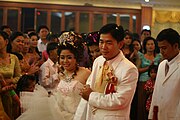In Cambodia, premarital sex is deplored. The choice of a spouse is a complex one for the young male, and it may involve not only his parents and his friends, as well as those of the young woman, but also a matchmaker. In theory, a girl may veto the spouse her parents have chosen. Courtship patterns differ between rural and urban Khmer; romantic love is a notion that exists to a much greater extent in larger cities. A man usually marries between the ages of nineteen and twenty-five, a girl between the ages of sixteen and twenty-two. After a spouse has been selected, each family investigates the other to make sure its child is marrying into a good family. In rural areas, there is a form of bride-service; that is, the young man may take a vow to serve his prospective father-in-law for a period of time.[4]

The traditional wedding is a long and colorful affair. Formerly it lasted three days, but in the 1980s it more commonly lasted a day and a half. Buddhist priests offer a short sermon and recite prayers of blessing. Parts of the ceremony involve ritual hair cutting, tying cotton threads soaked in holy water around the bride's and groom's wrists, and passing a candle around a circle of happily married and respected couples to bless the union. After the wedding, a banquet is held. Newlyweds traditionally move in with the wife's parents and may live with them up to a year, until they can build a new house nearby.[4]
Divorce is legal and relatively easy to obtain, but not common.[4] Divorced persons are viewed with some disapproval. Each spouse retains whatever property he or she brought into the marriage, and jointly-acquired property is divided equally. Divorced persons may remarry, but the woman must wait ten months. Custody of minor children is usually given to the mother, and both parents continue to have an obligation to contribute financially toward the rearing and education of the child.[4]
[edit] Social organization
Khmer culture is very hierarchical. The greater a person's age, the greater the level of respect that must be granted to them. Cambodians are addressed with a hierarchical title corresponding to their seniority before the name. When a married couple becomes too old to support themselves, they may invite the youngest child's family to move in and to take over running the household. At this stage in their lives, they enjoy a position of high status.[4]
The individual Khmer is surrounded by a small inner circle of family and friends who constitute his or her closest associates, those he would approach first for help. The nuclear family, consisting of a husband and a wife and their unmarried children, is the most important kin group. Within this unit are the strongest emotional ties, the assurance of aid in the event of trouble, economic cooperation in labor, sharing of produce and income, and contribution as a unit to ceremonial obligations. In rural communities, neighbors—who are often also kin—may be important, too. Fictive child-parent, sibling, and close friend relationships Cambodia transcend kinship boundaries and serve to strengthen interpersonal and interfamily ties. Beyond this close circle are more distant relatives and casual friends. In rural Cambodia, the strongest ties a Khmer may develop—besides those to the nuclear family and to close friends—are those to other members of the local community. A strong feeling of pride—for the village, for the district, and province—usually characterizes Cambodian community life.[5]
Legally, the husband is the head of the Khmer family, but the wife has considerable authority, especially in family economics. The husband is responsible for providing shelter and food for his family; the wife is generally in charge of the family budget, and she serves as the major ethical and religious model for the children, especially the daughters. Both husbands and wives are responsible for domestic economic tasks.[5]
[edit] Customs

In Khmer culture a person's head is believed to contain the persons soul--therefore making it taboo to touch or point your feet at it. It is also considered to be extremely disrespectful to point or sleep with your feet pointing at a person, as the feet are the lowest part of the body and are considered to be impure.
When greeting people or to show respect in Cambodia people do the "sampeah" gesture, identical to the Indian namaste and Thai wai
Customary Cambodian teachings include: that if a person does not wake up before sunrise he is lazy; you have to tell your parents or elders where you are going and what time you are coming back home; close doors gently, otherwise you have a bad temper; sit with your legs straight down and not crossed (crossing your legs shows that you are an impolite person); and always let other people talk more than you.
0 comments:
Post a Comment